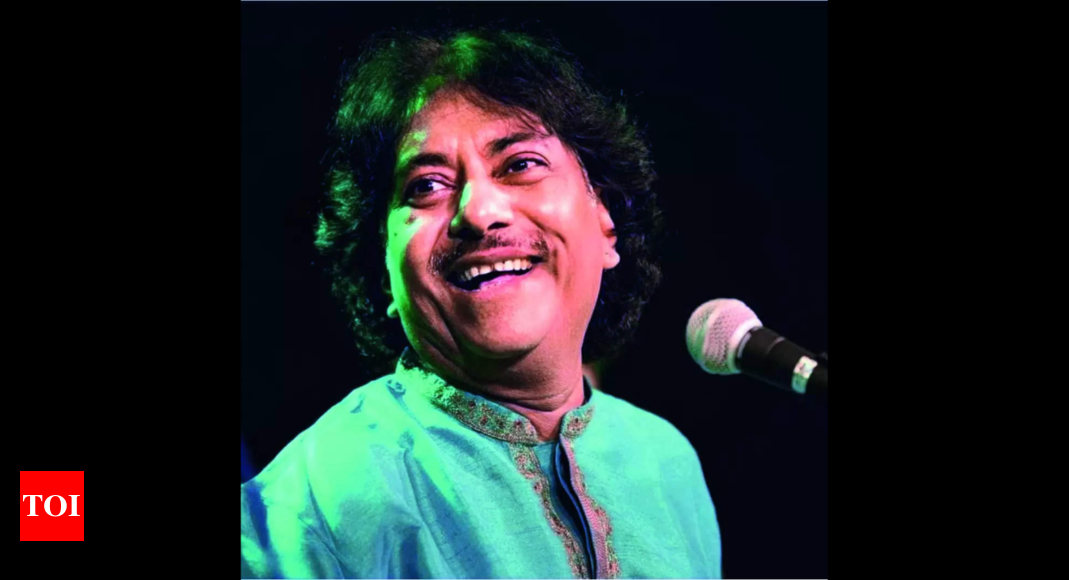In a paradox of our times, the most gorgeous rendition in praise of
Saraswati
in raga
Bhairavi
has been sung by one who may have never used the word ‘syncretic’ in his life, but whose music was like an abiding prayer that transcended any faith.
Indian classical vocalist
Rashid Khan passed away in a
nursing home
in Kolkata on Tuesday after battling cancer.
He was 55 years old.
The extraordinarily versatile
musician
will be remembered for being able to traverse complex alaaps, taans and taranas with as much ease as he could sing a film song – the most memorable one being ‘Aaoge Jab Tum Saajana…’ for Imtiaz Ali’s ‘Jab We Met’.
“I remember while at the recording booth, he was completely an unexpected personality. We were expecting him to behave like a maestro, but he said, ‘I’ve never done this before, so don’t think of me as a trained singer, but as a newcomer.’ This was very disarming,” Ali told TOI.
Rashid Khan shot into national limelight when he was remarkably young, defying an arena where the wisdom of age is often considered a prerequisite for great music. His youth belied the maturity in his music, prompting the legendary Bhimsen Joshi to declare him to be the “great hope” for the future of Indian classical music.
Rashid Khan belonged to the Rampur-Sahaswan gharana or lineage. He was born in Sahaswan, Badayun in Uttar Pradesh, and trained under his grand-uncle Ustad Nissar Hussain Khan.
In a paradox of our times, the most gorgeous rendition in praise of Saraswati in raga Bhairavi has been sung by one who may have never used the word ‘syncretic’ in his life, but whose music was like an abiding prayer that transcended any faith.
Indian classical vocalist
Rashid Khan
passed away in a nursing home in Kolkata on Tuesday after battling cancer. He was 55 years old.
The extraordinarily versatile musician will be remembered for being able to traverse complex alaaps, taans and taranas with as much ease as he could sing a film song – the most memorable one being ‘Aaoge Jab Tum Saajana…’ for Imtiaz Ali’s ‘Jab We Met’.
“I remember while at the recording booth, he was completely an unexpected personality. We were expecting him to behave like a maestro, but he said, ‘I’ve never done this before, so don’t think of me as a trained singer, but as a newcomer.’ This was very disarming,” Ali told TOI.
Rashid Khan shot into national limelight when he was remarkably young, defying an arena where the wisdom of age is often considered a prerequisite for great music. His youth belied the maturity in his music, prompting the legendary Bhimsen Joshi to declare him to be the “great hope” for the future of Indian classical music.
Rashid Khan belonged to the Rampur-Sahaswan gharana or lineage. He was born in Sahaswan, Badayun in Uttar Pradesh, and trained under his grand-uncle Ustad Nissar Hussain Khan.
Training under his grand-uncle Ustad Nissar Hussain Khan, Rashid Khan used to sing by the river bank or visiting the mazhars of his ancestors. There are many stories about his complex relationship with his disciplinarian teacher — how he had to spend days just to perfect ‘sa’ and would get thrashed in public if he played truant.
He later moved to the Sangeet Research Academy in Kolkata, where he was a resident teacher for many years. Many fans suggest that his voice had a honey-like warmth that grabbed listeners the instant he sang the first note. He could sing the slow tempo alaap with the meditative quality of an Amir Khan and move seamlessly into a fast-tempoed tarana or a romantic thumri like ‘Yaad Piya Ki Aaye’.
Khan has also sung for films like ‘My Name Is Khan’ and ‘Raaz 3’. His long-time musical accompanist, Bickram Ghosh, made him record ‘Barsat Sawan’ for ‘Jongole Mitin Mashi’ and ‘Ei Bhara Badara’ for ‘Kadambari’. Many eyes would well up every time music director Tapan Sinha made him sing ‘Megh Jome Aachhe’ in Bratya Basu’s ‘Tara’.
Vocalist Ashwini Bhide Deshpande says that he has left a void in the music world. She recently sang in his place several times when he was forced to cancel his concerts because of failing health. Musician Shubha Mudgal says, “I can hear in my head Rashidbhai’s beautiful voice calling out in Raga Des, ‘Karam Kar Dije’, asking for Khwaja Moinuddin’s grace and benevolence, and I hope his prayers will be heard and that his young son and many disciples will take his legacy forward.”

